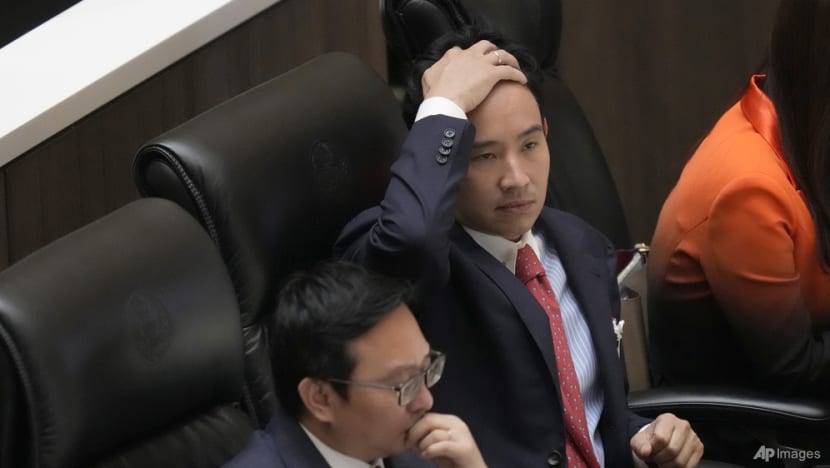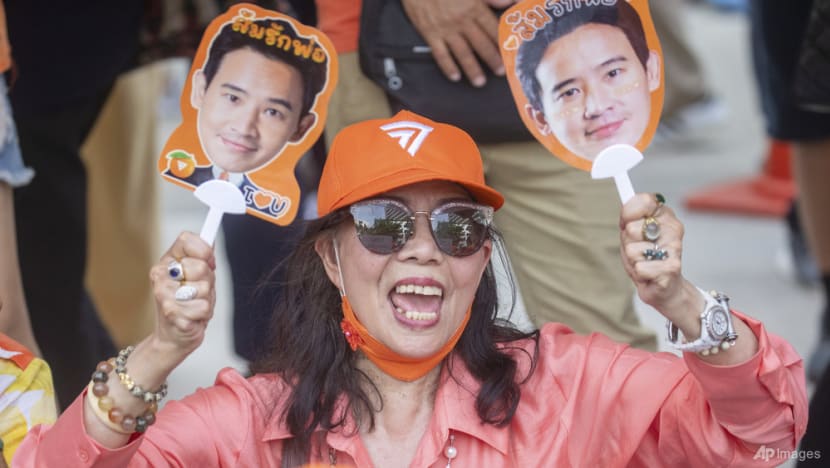Move Forward Party leader Pita's prime minister bid defeat 'a blow to the Thai electorate': Analysts
It remains unclear whether the charismatic leader of the progressive Move Forward Party would be renominated or if he would face any additional candidates.

Thailand’s prime ministerial frontrunner Pita Limjaroenrat’s failed initial bid to take the top job has dealt “a blow” to the Thai electorate, said observers, adding that the wait to see an end to political stranglehold continues.
The progressive Move Forward Party leader was the sole candidate in the prime ministerial selection.
However, the 42-year-old businessman fell 51 votes short in a high-stake parliamentary vote on Thursday (Jul 13), after being thwarted by a Senate appointed by the royalist military following a 2014 coup.
“I think it was a blow to the Thai electorate much more than to Mr Pita himself,” said Dr Michael Montesano, associate senior fellow at the ISEAS–Yusof Ishak Institute.
“The Thai electorate made its wish very clear in the elections, and I think that they've now seen that there are forces and structures that impede their will.”
WHAT IS NEXT FOR MR PITA AND HIS MOVE FORWARD PARTY?
Move Forward was the surprise winner of the May 14 election, in a resounding rejection of nine years of conservative, military-backed rule. The party formed a coalition with seven allies. Together, they have 312 seats in the 500-member House of Representatives.
“My sense right now is that the level of outrage has not yet reached the boiling point that we'll see will lead to real trouble on the streets,” Dr Montesano told CNA’s Asia First on Friday.
“The issue, of course, is that as yesterday's results sink in, and as we approach a second and potentially third vote, people will begin to get more upset.”
After the vote, Mr Pita vowed to press on in his quest to become the country’s prime minister.
“Regarding the voting results, I have to say that we accepted it but we will not give up,” he said. “We won’t give up just yet. We’ll spend time to strategise how to consolidate votes for the next round.”

A second round of voting is scheduled for July 19, but it remains unclear whether Mr Pita would be renominated or if he would face any additional candidates.
Dr Montesano said: “In terms of what he can do now, I suspect that the Move Forward Party will continue to meet, as frequently and intensively as possible, with senators all behind the scenes to try to persuade them.”
Whether other candidates will be put forward on Jul 19 is not known, he added.
“We have to assume that there are fairly tense discussions going on now between his coalition party partner, the Pheu Thai Party and his party, and that Pheu Thai is chomping at the bit for the chance to put its man forward or its candidate forward.”
WINNING OVER OPPOSITION, SENATORS
Some analysts suggested that the coalition could try winning over the smaller opposition parties.
“I think they may reach out to a few of the smaller opposition parties, and see if they can convince some of them to support Pita’s attempts to become prime minister,” said Associate Professor James Ockey of the University of Canterbury.
“In a sense, all of the parties in the House of Representatives do share some common cause here, because the leader of the largest party traditionally in a parliamentary system should become the prime minister.”
It is in the interest of all members of the House to support that principle, he told CNA938 on Friday.
“Perhaps they can get a few more votes from some of the opposition parties, and I think that will be their strategy," he said.
To become Thailand’s 30th prime minister, Mr Pita had to garner the requisite approval of at least 375 parliamentarians on Thursday, but he only managed to secure 324 votes.
Notably, only 13 senators supported Mr Pita's bid, while 34 voted against him and 159 abstained.
However, observers are not surprised.
This comes as Thailand's Election Commission recommended on Wednesday, a day before the vote, that the Constitutional Court suspend Mr Pita over allegations that he broke campaign rules as an MP.
“When the Election Commission puts that forward to the court, it is a kind of a signal that they may be prosecuting him and he may lose his seat in parliament,” said Dr Ockey.
But it may be an uphill task for Mr Pita to get more senators to vote for him, and over a short few days. All senators were appointed under the junta-drafted constitution.
“I don't think it's a given that he can convince enough of them. He needs another 51 votes,” said Dr Ockey, whose research interests include comparative politics and Southeast Asia.
“It may be that he can win over a few votes from opposition parties, but he won't get enough (votes) there. So he has to win more senators.”
Move Forward's main ally Pheu Thai Party is expected to stick with Mr Pita for the second ballot for a new prime minister next week, said observers.
“If they're seen as quickly flipping sides and moving to work with the caretaker government parties, then it could be politically damaging,” said Mr Jay Harriman, senior director at BowerGroupAsia.
“The easiest route for Pheu Thai is probably to give Pita one more chance before deciding on alternative options.”
Dr Montesano noted that if Pheu Thai teamed up with parties associated with a previous military-backed government, many voters would be very upset, and that could be one trigger for unrest.
“If Pheu Thai worked out a compromise and continued to work with Move Forward and Move Forward remained in the coalition, voters might be less upset," he said.
POLITICAL INSTABILITY CONTINUES
Experts believe many political gatherings will be held over the next few days, including Move Forward supporters taking to the streets in support of Mr Pita.
“I think on the economic side, this is not good for business and investor confidence. The longer we have these delays, the worse it's gonna be for the economy,” said Mr Harriman, who has served as a political and business adviser for prominent private investment groups and international companies with operations in Southeast Asia.
“We've already seen significant foreign funds flow out of the Thai economy in the last year. So the longer there is a delay, I think the worse it's gonna be for the economy.”
However, political observers are not sure how long it will take before Thailand picks its new leader.
“The rounds could go on and on, but hopefully it will end sooner than later so that everybody can move on,” he told CNA’s Asia Tonight.

He noted that Thailand still has a structural issue that makes it prone to political instability.
“Because on the one hand, you have a significant number of voters who see that political transitions should be done through the ballot box,” said Mr Harriman.
“But then, there's also a minority of people who don't necessarily think that that's the way it should be done. And when they lose elections, they aim through connivance and manipulation, they aim through judicial coups and so forth, to oust the democratically elected government.
“So until those fundamental issues are resolved, we still will unfortunately be experiencing periods of political instability.”

















